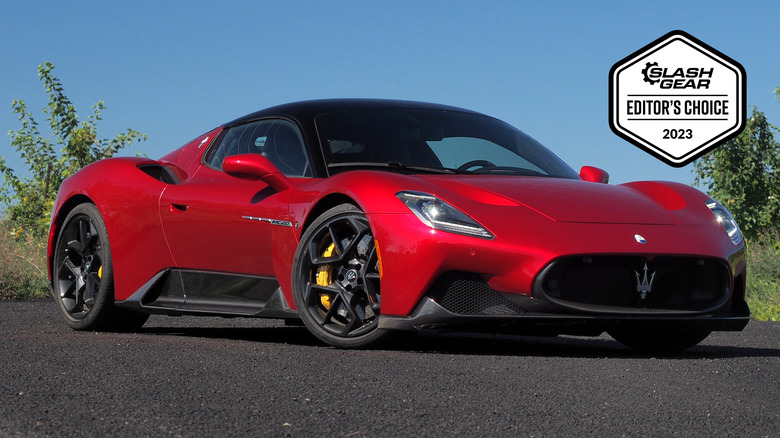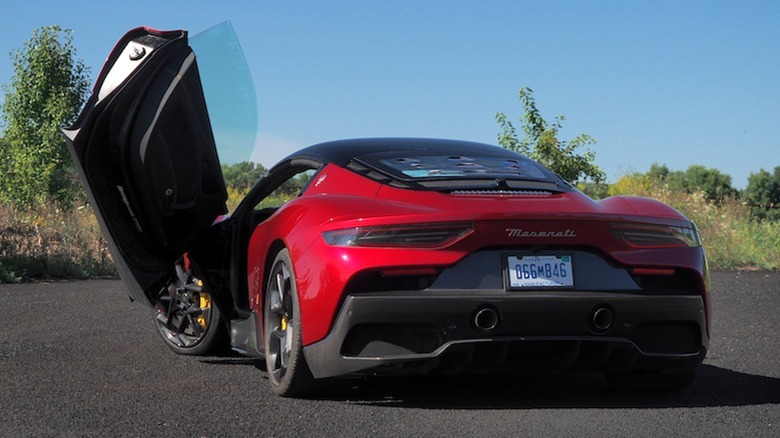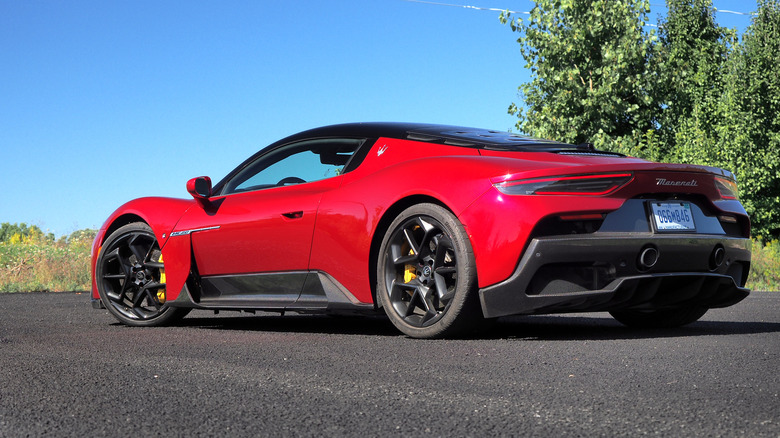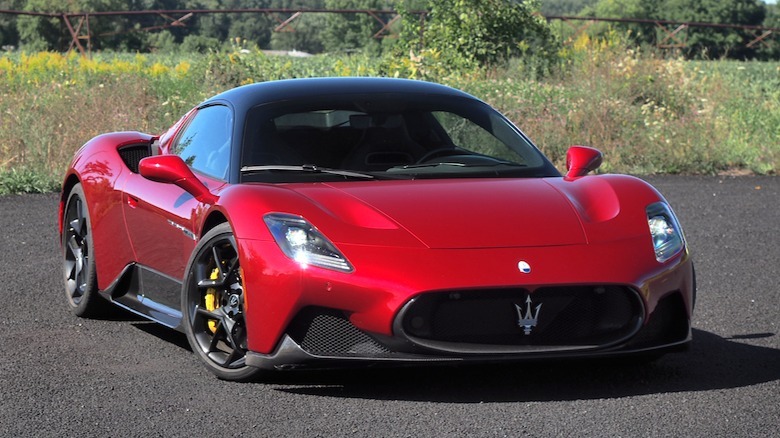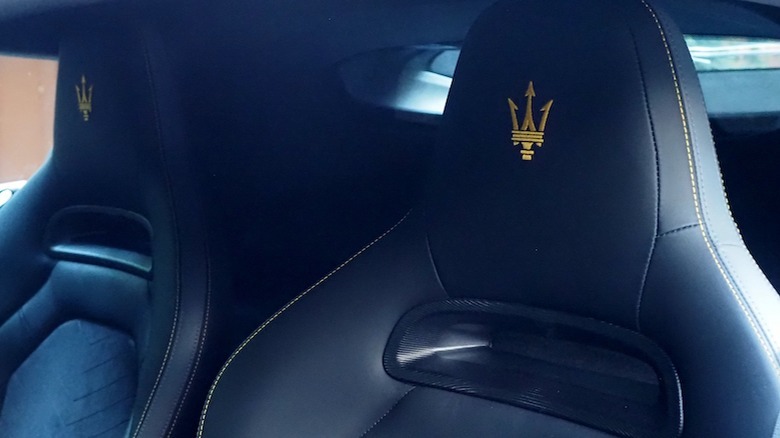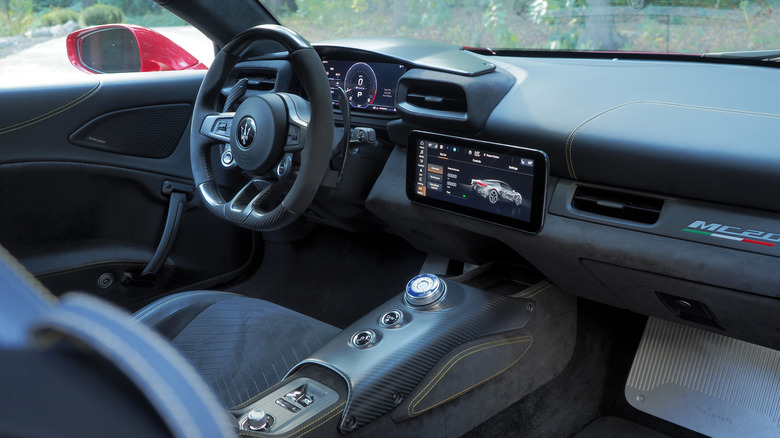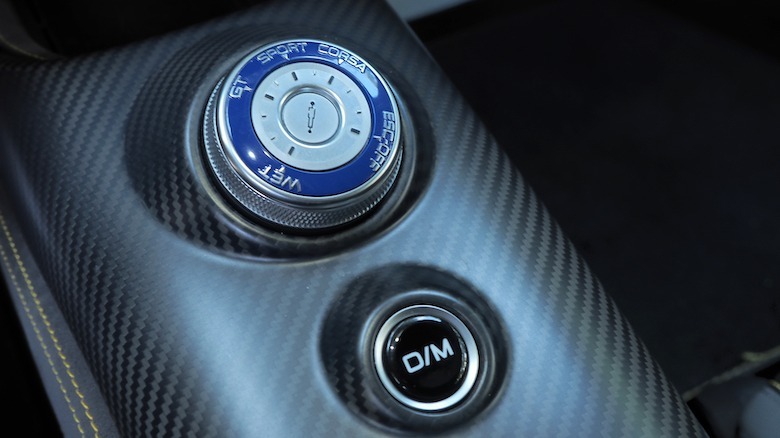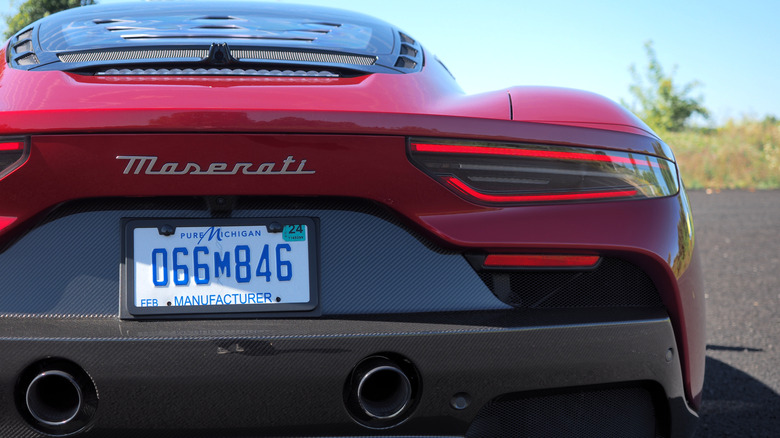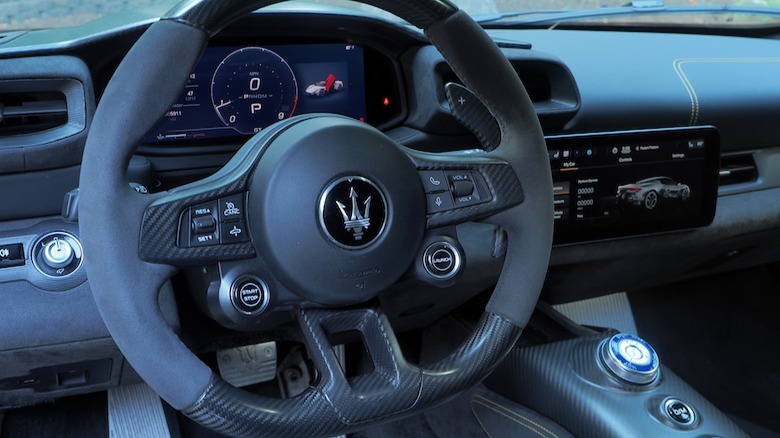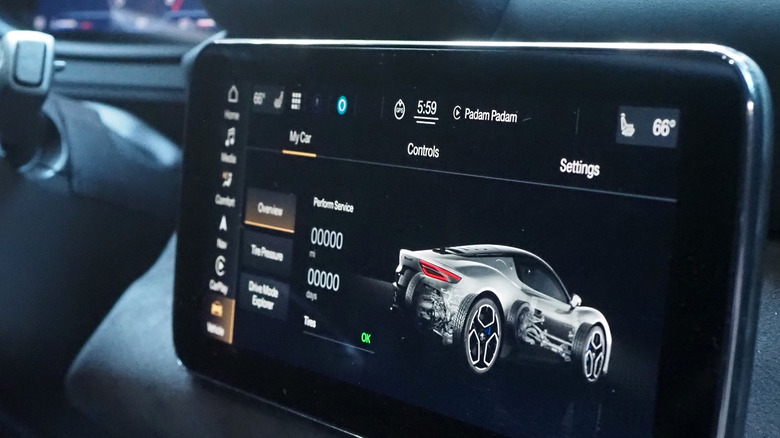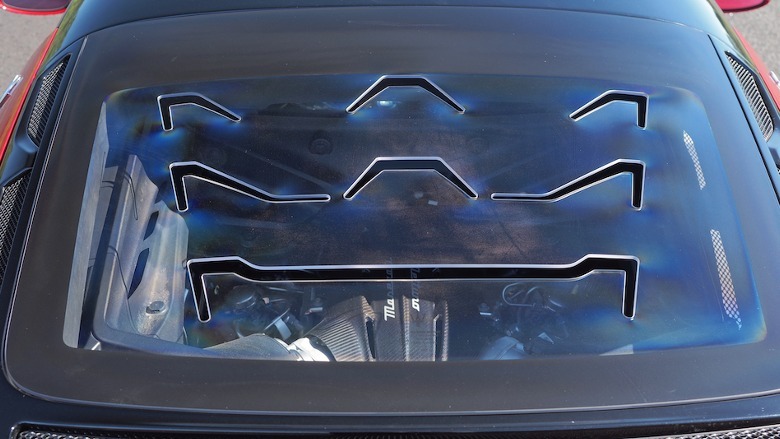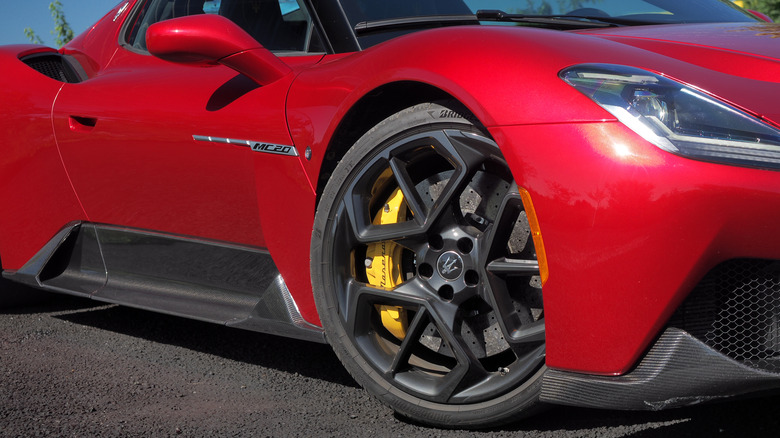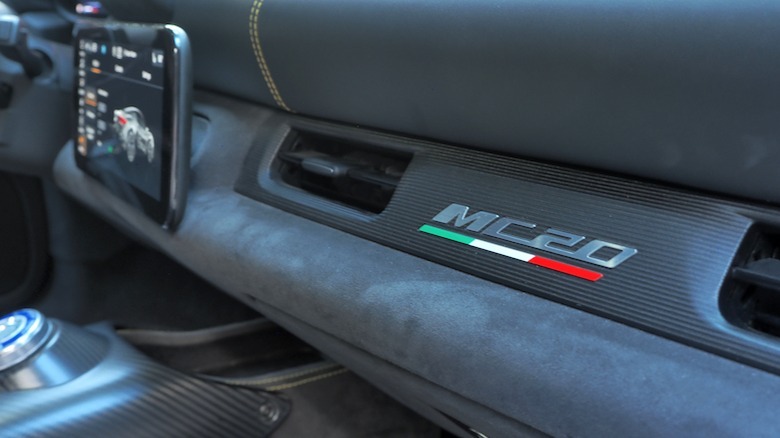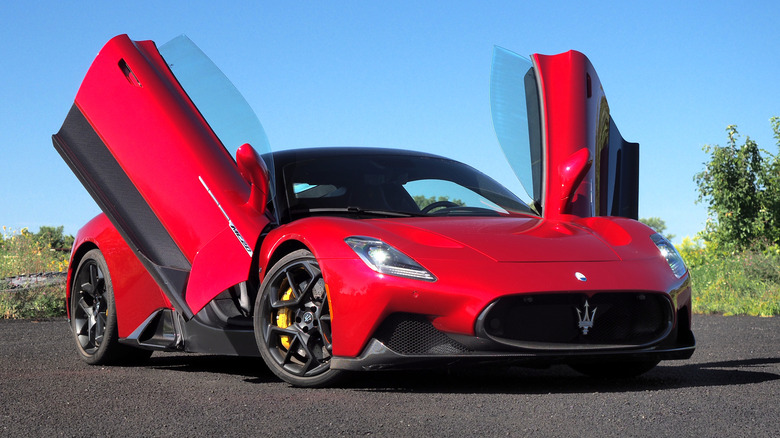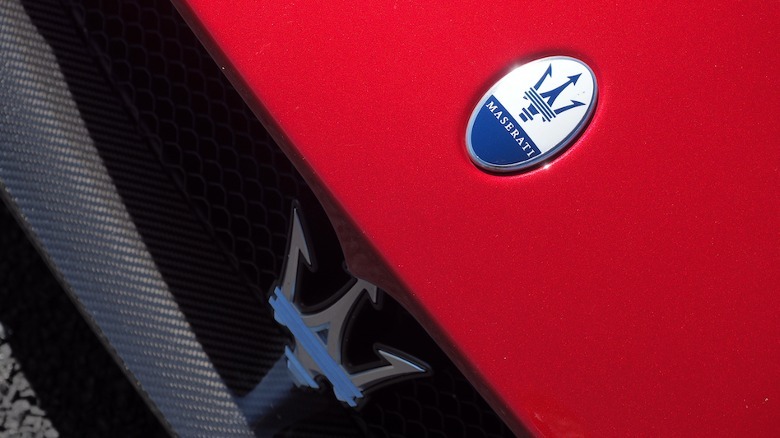Maserati MC20 Review: The Supercar Best May Be Yet To Come
- Head-turning style meets neck-snapping speed
- Cabin feels special
- EV future is promising
- Expensive
- Aesthetics are subjective
- You didn't need cargo space, right?
The supercar as we know it is dying. Not in the sense that mesmeric styling and gut-twisting speed will ever go out of fashion, at least for a certain audience of motoring aficionados. Nor, even, that there's no longer a market for super-expensive, super-exclusive exotics signifying wealth and access. It's more that the current equation for shiny expensive car go fast faces its end-of-an-epoch moment.
The Maserati MC20 sure is shiny, and it certainly counts as fast. As price tags go, kicking off north of $200k before options means it definitely has the expensive part down, too. Equally key, it's also a risk: a return, for Maserati, to the supercar segment it was absent from for almost two decades, but with a formula that skips what's typical from its super-speedy brethren.
In all, it's a mighty fine thing to look outside and see parked on your driveway. At the same time, it's a gleaming reminder that time is just about up for the supercar as we know it and love it. Don't fret, though: that's probably a good thing.
Who needs stealth, anyway
"Pretty" is perhaps not the right term for the MC20. It does, certainly, what most of us require from our supercars: turn heads, steal attention, and generally slice through more mundane traffic like a shark amid minnows. With its wide, low maw and the constant sparkle of gravel against the carbon fiber tub, there's a sense of something predatory prowling deep waters.
As predators go, mind, it's a poorly camouflaged one. Everything about the MC20's proportions screams look-at-me and the bright red Rosso Vincente paintwork here does nothing to dial that back. Add in the butterfly doors, and this is the epitome of a fast car on the road that makes you slow when you park: simply everyone has a question, a comment, or the pressing need for a selfie.
Allow them to slip inside, though, and the MC20's unexpected practicality rears its head. The hinge of the doors makes sliding into the bucket seats a little less awkward than you might expect; the sills aren't quite as broad as you'd fear.
Silly, but usable with it
Expecting our six-figure playthings not to embarrass us seems like an ask too far, but today's supercar buyer is a spoiled customer. Gone are the days when a piping-hot cabin, every-other-day reliability, and ergonomics better suited to a Space Shuttle would be acceptable. These days, exotics also have to serve as daily drivers, at least to some extent.
The MC20's dashboard refinement certainly helps, especially if you've spent time in Maserati's other — more affordable — models. No more Stellantis-parts-bin switchgear, masquerading as special with gussied-up trim pieces. Instead, the MC20's cabin feels sparse in a focused way, and its infotainment screen is compact but comprehensive.
Almost everything feels intuitive: just don't go looking for Neutral or Park buttons. The former requires pulling both carbon fiber paddle shifters toward you; the latter kicks in automatically when you shut the engine off. Supercars must have their foibles, after all.
A shining example of old tech
Glinting beneath the louvered rear glass is Maserati's Nettuno, its homegrown V6 engine that is — and this is meant in the best possible way — a glorious folly in the annuls of automotive history. Developing, in-house, a brand new twin-turbo 3.0-liter gas engine at a time when all signs (including your own roadmap) are pointing to electrification being the future feels like Italian whimsy at its finest. That doesn't mean the MC20's roaring heart is anything like a joke, however.
The 621 horsepower and 538 lb-ft of torque aren't just impressive for an engine of this displacement and this many cylinders, they're impressive period. Factor in the MC20's weight — under 3,300 pounds — and it means 0-60 mph arrives in less than 2.9 seconds. The 202 mph top speed ensures a spot when the supercars are listing off their bragging rights.
Yet, despite all that, it's impossible to escape the sense that this is "old" tech. This is the last dinosaur-fueled bellows of old-school motoring excess, and it's not like Maserati itself is doing anything to dissuade us of such notions. This Nettuno-powered car is just one waypoint on the MC20's path to full electrification, something that — like the MC20 Cielo convertible — was intended for it all along.
Electrification is coming... in some form
What might such an electric MC20 be like? With Maserati playing those cards close to its chest — showing only, so far, the fully-electric GranTurismo Folgore to whet appetites and loosen pocketbooks — it's Alfa Romeo that pipped its Stellantis stablemate to the post. The Alfa Romeo 33 Stradale, unveiled earlier this year, will also be offered in 3.0-liter V6 and full EV forms, the latter packing 760 horsepower and around 279 miles of (WLTP) range.
Vanishingly few will be made — only 33, in fact, all sold — with a price tag that, unless your name is on the order form, you don't get to know.
It's tough not to feel like those lucky, wealthy drivers are paying handsomely for the privilege of being beta testers — if not alphas. For sports cars more than any other category, the evolution toward electrification hits reset on years — decades, even — of refinement rather than revolution. Model year improvements that amount to tenths of tenths of a second speed increases; polishing what can be squeezed from fossil fuels when practicality and price are left at the wayside.
It's fast, of course it is
On public roads, at a legal pace, the gas-powered MC20 is hardly lacking. There's a sense of engagement that only being sandwiched inches from the asphalt with a howling engine just behind your head delivers. You can't use anything close to its full capabilities: leaning more than a little into the knurled accelerator pedal is enough to send your driving license into spontaneous combustion.
Instead, you must sample the Maserati's prowess in tiny, feisty chunks; slaps of ridiculous pace gobbled greedily and fleetingly like fiery chilies on a tasting board. Wise owners will simply take their MC20 to the track.
It's mood more than momentum which symbolizes the MC20's challenge — or, rather, the challenge of the sports car industry as a whole. Electric vehicles have already demonstrated themselves to be capable of better acceleration and greater overall speed than their gasoline predecessors. Even relatively mainstream EVs can hold their own against exotics in the straight-line dash from a stop sign. They're so good at it, in fact, that they've arguably stumbled right into "clinical."
Maserati MC20 Verdict
That's not a word you'd use to describe the MC20, but it'll be fascinating to see how automakers like Maserati rise to the electric challenge and which of their old lessons learned they can carry across with them. Weight, possibly the greatest antithesis of accessible speed, is the enemy of the supercar, but the inevitability of an EV's battery pack.
Balancing realistic expectations of electric range without buoying curb heft to SUV levels is the challenge that sends performance automakers back to a time when each new model felt innovative, not incremental. You don't need to be a total EV convert to find the engineering required fascinating — or to wonder which car company might best rise to it.
None of that changes how special the MC20 feels today. If the requirements of a supercar are that it must wow and woo in equal measure, then Maserati's finest surely delivers. It is grin-inspiring whether driven slow or fast, silly to just the right degree, and a fitting reminder of the automaker's not-insubstantial engineering talents. That's the supercar table stakes sorted, then. Now, the MC20 just has to prove it can nail the second act.
